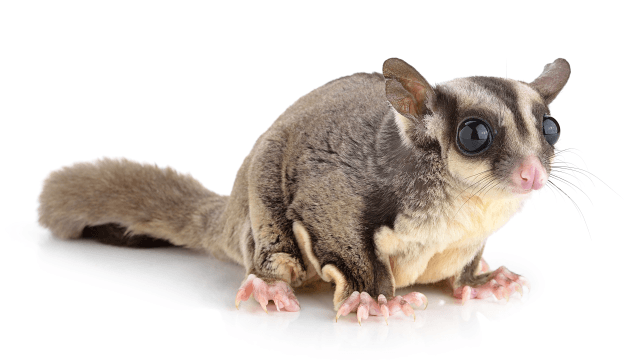SUGAR GLIDER VET
Sugar Glider Veterinarian Serving Ohio
Our sugar glider vet, Dr. Riggs, has over 30 years of veterinarian experience with exotic animals including sugar gliders. We provide a full line of healthcare and treatment for the special needs of sugar gliders. Sugar gliders are cute exotic marsupials that bond well with humans and therefore make endearing pocket pets with a little time and patience. They are very social animals and need to have regular contact with other gliders or humans in order to stay happy and healthy. The thin membrane that stretches from their wrists to their ankles gives them the unique ability to “glide” distances documented up to 150 feet!
- Healthy Glider: Eyes are perky and bright. Coat is smooth and silky. Activity level is moderate to high.
- Ill Glider: Ears are down, eyes are dull or squinted, coat may be matted, greasy, or stained with a brownish or yellowish tint in areas of fur that should be light. Activity level is low.
If you notice behavior changes in your sugar glider, it’s important to contact us right away. They are sensitive creatures prone to stress that can cause illness. Often, they don’t exhibit signs of illness until they are very sick. We provide the following sugar glider veterinarian services:
Sugar Glider Wellness Exams
We recommend annual wellness exams. As part of your pets wellness examination, we’ll consult with you about your concerns and discuss specific needs of your sugar glider such as diet. We will examine cloaca, teeth, ears, eyes, mouth, skin, and check vitals for signs of illness. If we find anything abnormal, we may do testing to diagnose possible illness.
Examples of Tests Offered:
- COMPLETE BLOOD COUNT (CBC): A CBC is great laboratory tool that allows a veterinarian to “peek” inside your bird. By assessing the variety of blood parameters we can detect infections, viral diseases, blood parasites, response to disease, and states of anemia to name a few. This test can be done in our office at the time of your bird’s exam to aid in our ability to assess your pet’s health.
- BLOOD PROFILING: A blood profile or serum chemistry series is a group of blood tests used to assess various organ functions or disease states. Kidney function, liver abnormalities, pancreatic disease are but a few of the conditions a blood profile can help evaluate.
- SEROLOGIC TESTING/SPECIFIC DISEASE TESTS:
Serologic tests use a combination of technologies (including state-of-the-art DNA probe tests) to screen your pet for the presence of various contagious diseases. Some examples of common tests used are:
- CHLAMYDIA TESTING: Chlamydia, or parrot fever, is a contagious bacterial disease of birds that is also potentially contagious to humans. A variety of symptoms can be displayed and some birds can be healthy acting carriers. Although a culture is the “gold standard” for testing, a number of different tests are available to use in different situations to screen for this important disease.
- PBFD: Psittacine beak and feather disease is a viral disease capable of infecting a wide variety of bird species. This potentially fatal disease can progress slowly or rapidly and involve a range of feather and beak lesions. Although no cure is currently available, this test can be used to help screen for the presence or absence of this disease in your pet.
- POLYOMA: Polyoma virus is another potentially devastating disease of pet birds that has a variety of presentations and outcomes. Lesions can involve feathers or cause widespread tissue destruction and acute illness. Testing as well as a vaccine is available for this disease.
- PACHECO’S: Pacheco’s disease is a highly infective herpes virus of birds. Disease can be rapid, widespread, and fatal or sporadic with asymptomatic carriers. DNA testing is now available to help detect and prevent this catastrophic disease.
Sugar Glider Parasite Control
Sugar Gliders frequently carry parasites. All sugar gliders sharing a cage should be treated if one becomes infected. We provide parasite control treatments to keep your sugar glider pest free.

Sugar Glider Nutritional Consultation
Sugar Glider Behavioral Problems
Sugar Gliders are omnivores and eat a variety of foods. They require a specialized and balanced diet including pellets to remain healthy. We will go over your gliders current diet and offer suggestions and possible improvements to keep him in peak condition.
Sugar Gliders may self-mutilate or chew on themselves, causing serious injury and can be fatal if not treated. Possible reasons for self-mutilation include extreme stress, pain, post surgical issues, lack of attention, grief, poor nutrition, or parasites. First symptoms may appear as over-grooming, with areas of hair missing or damaged cloaca or tail. Normally, gliders make a distinctive crying sound when self mutilating. Contact us right away if you notice this behavior.
Sugar Glider Diagnostic, Therapeutic, and Surgical Procedures
Our goal is to keep your sugar glider healthy and prevent illness. If your pet is injured or ill, rest assured that we have the tools necessary to diagnose the problem and offer state-of-the-art treatment. From blood testing and radiographs to ultrasound and endoscopy, we have the means to track down your pets’ problems. Once the problem is uncovered we have the expertise, equipment, and the years of experience needed to provide the therapy or surgical procedures required to help even the smallest patient.
Sugar Glider Emergency Care
Our office is open for your sugar glider’s health care needs Monday through Friday 8:00-6:00 and Saturday 8:00-4:00. If emergency care is required after these hours, you can rely on our 24 hour emergency facility- the Metropolitan Veterinary Hospital. Metro is located at 1053 S. Cleveland-Massilon Rd. in Copley (330-666-2976) and is there to assist with any of our client’s problems. At Metro we have veterinarians and technicians on duty 24 hours daily to address your needs. Metro’s staff doctors rotate through our clinic on a regular basis to assure that they are comfortable addressing the problems of our clients.




